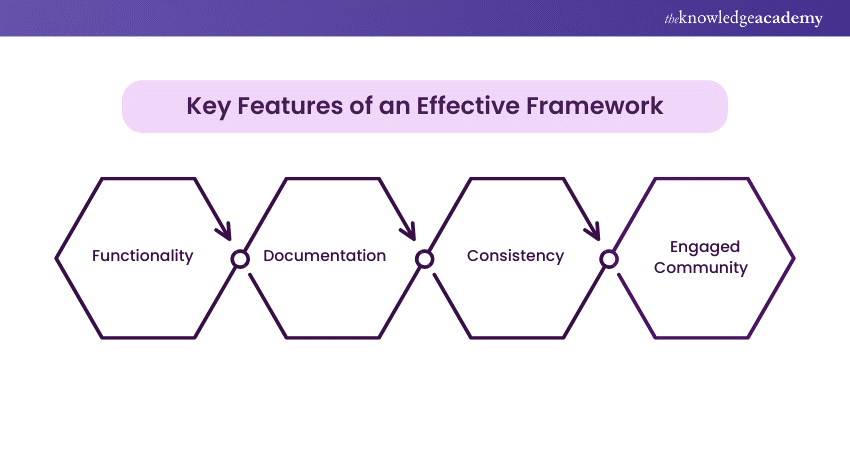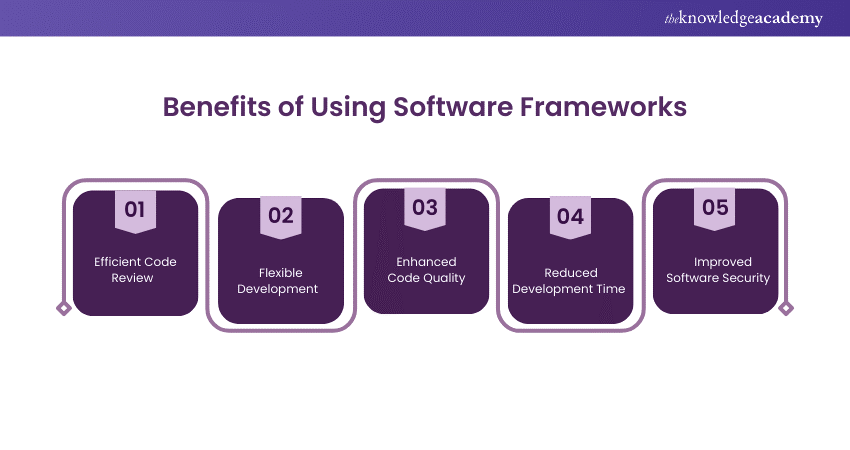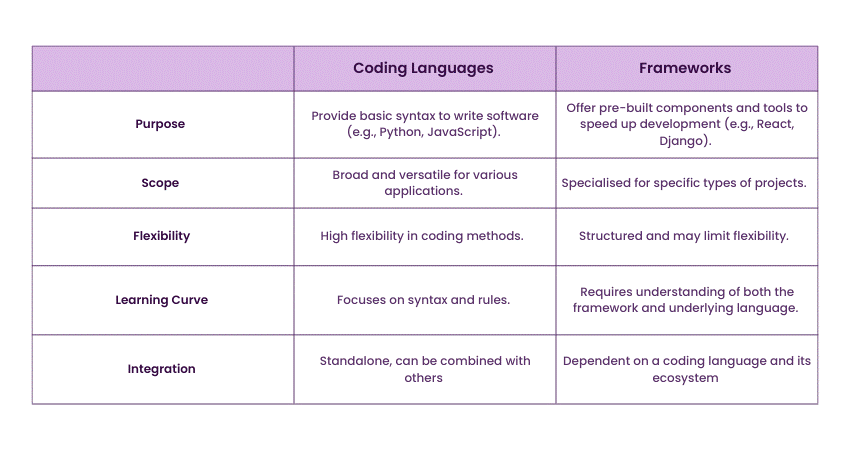We may not have the course you’re looking for. If you enquire or give us a call on +0800 780004 and speak to our training experts, we may still be able to help with your training requirements.
We ensure quality, budget-alignment, and timely delivery by our expert instructors.

Wondering What is a Framework in Programming? A framework is a systematic structure in programming that offers a stable method of crafting and launching software apps. It also has a pre-defined code snippet and library to simplify the development process. Developers can utilise it to build unique functionalities. Frameworks assist in sustaining consistency and enhancing code quality by applying the best guidelines.
In this blog, we will delve into What is a Framework in Programming, its benefits, and the different types of frameworks available.
Table of Contents
1) What is a Framework in Programming?
2) Why do we use Programming Frameworks?
3) Key Features of an Effective Framework
4) Various Types of Programming Frameworks
5) Benefits of Using Software Frameworks
6) Challenges Associated with Frameworks
7) Differentiating Between Coding Languages and Coding Frameworks
8) Conclusion
What is a Framework in Programming?
In software engineering and programming, a framework consists of reusable software components created to streamline the process of developing new applications. Utilising previous development work is essential in every branch of engineering. For instance, electrical engineers use current electronic parts to build fresh gadgets. Thus, adhering to set standards and requirements for compatibility assurance.
Likewise, in Programming, frameworks are made up of reusable code modules based on software standards and protocols. These frameworks can also establish and uphold specific architectural guidelines or business procedures. They also facilitate the development of new applications in a uniform and effective way.
Why do we use Programming Frameworks?
Programming Frameworks are widely accepted as a norm and are viewed as a vital skill that all programmers should have. They pull out the necessity to begin anew, enabling developers to focus on the specific features of their projects, websites, or apps. Let's explore the need to use various frameworks in programming.
Frameworks help reduce the amount of time needed. Using a coding framework when starting projects can save a vast amount of time. Developers can improve their efficiency by utilising these pre-made code snippets, removing the necessity to start from scratch each time the code.
Frameworks, including MEAN Stack, help minimize mistakes. Open-source frameworks have been refined and tested by numerous developers, enhancing their reliability and effectiveness. This initial screening process helps reduce errors and glitches, ensuring a solid foundation. Additionally, it lowers the likelihood of potential issues compared to writing code from scratch. For those preparing for related roles, exploring MEAN Stack Interview Questions can provide valuable insights.
Frameworks can be adjusted as needed. They are created to be adaptable, enabling developers to adapt and customise them to meet specific project needs quickly.
Frameworks make debugging easier. Fixing errors can feel tedious; however, coding frameworks can make the task easy. Instruments like error-tracking and debugging simplify the task of finding glitches, thus facilitating the identification of mistakes.
Key Features of an Effective Framework
There are various framework types available. Some of them are more widely used than others. However, developers often use frameworks they are comfortable with. Consider the given key features below when it comes to picking the right framework:

1) Functionality
Pick a framework that provides unique functionalities for your development projects. Avoid those that can lead to complexity. It is vital to match the framework capabilities to satisfy your project needs.
2) Documentation
Documentation plays a crucial role in the programming framework. Good, well-written documentation offers crystal-clear guidance and training. It saves time and minimises code errors during development and also helps in troubleshooting.
3) Consistency
Select a programming framework that encourages stability using a unified approach. It should provide consistency to sustain a standard codebase, making it easier for team members to engage and familiarise themselves with the work.
4) Engaged Community
When choosing a framework, look for a strong, active community. A well-established framework provides resources and support to enhance its reliability. An active community also contributes to updates, extensions, and plugins.
Boost your Web Development skills with our PHP Course- Sign up now!
Various Types of Programming Frameworks
In programming, frameworks come in different forms. Let’s explore various types of Programming Frameworks here:

1) Content Management Frameworks
Content Management Systems (CMS) allow users to craft, arrange, and edit content such as blogs, eBooks, and mobile applications. Content Management Frameworks (CMFs), like CMS platforms, offer reusable elements for managing online content.
a) WordPress: WordPress is the widely used open-source CMS platform. It is known for its ease of use and popularity, and its users range from small blogs to large online stores. Some of its prominent users include Sony Music, Angry Birds, TechCrunch, and BBC America.
b) Drupal: Drupal is renowned for its strong taxonomy and extensive community, which are key Features of Drupal. It is a flexible CMS built on PHP, suitable for projects that are content-heavy and have community aspects. Arsenal FC, InStyle, Mattel, and Tesla are some of the well-known users.
c) Joomla: Joomla is an open-source CMS that is more advanced than WordPress yet simpler than Drupal. It offers SEO optimisation and a solid security reputation. Prominent users include IKEA, LINUX, and Harvard University.
d) Kentico: Kentico is a paid content management system based on ASP.NET and Microsoft SQL Server. It offers fast setup and pre-built functionalities. Skype.com, NewsMax, and Gibson are some of the notable users.
2) Mobile Application Frameworks
Mobile App Development Frameworks allow the creation of apps for distinct environments, which can be native, hybrid, or cross-platform.
a) React Native: When considering Angular vs React vs Vue for front-end frameworks, the MEAN Stack—comprised of MongoDB, Express, Angular, and Node.js—remains one of the most popular and widely used web development frameworks. Facebook, Skype, Shopify, and the NFL are among its well-known users.
b) Flutter: Flutter vs React Native: Flutter is Google's framework for creating apps on various platforms, such as the web and desktop. It is also publicly available. Prominent users include Amazon, Microsoft, Adobe, and eBay.
c) Xamarin: Xamarin, which Microsoft owns, utilises C# and .NET to allow developers to create cross-platform applications by sharing a common codebase. Prominent users from companies include Alaska Airlines, Microsoft Azure, and BBC Goodfood.
d) Ionic: Ionic is an open-source Mobile App Development Framework that works across different platforms. Prominent users include JustWatch, MarketWatch, and Untappd.
e) Apache Cordova: Apache Cordova, originally named PhoneGap, is an open-source framework that uses JavaScript, HTML, and CSS to develop applications compatible with various platforms. HealthTap and Trello are both well-known users.
3) Data Science Frameworks
Data Science Frameworks use statistics, algorithms, and scientific approaches to uncover insights from data. Commonly used frameworks consist of TensorFlow, PyTorch, Apache Spark, and NumPy.
a) TensorFlow: TensorFlow, a machine learning platform developed by Google, is open source. It is used for speech and image recognition tasks in deep learning applications. Prominent users of Google Translate, FaceNet, and Google RankBrain are well-known.
b) PyTorch: PyTorch is an adaptable platform for creating deep-learning models. It is widely used in AI tasks such as image recognition and natural language processing (NLP).
c) Apache Spark: Apache Spark is a free software framework for analysing big data that works with Java, Scala, Python, and R. It is utilised to process vast amounts of data and conduct real-time analytics.
4) Web Frameworks
Web frameworks, also known as web application frameworks, aid in the creation of web applications such as web services, resources, and APIs. They are categorised as either front-end (client-side) or back-end (server-side) frameworks.
5) Front-end Frameworks
Front-end Frameworks offer necessary HTML, CSS, and JavaScript templates and elements, allowing the development of user interfaces (UI) for websites and web applications.
a) Angular: Angular is a TypeScript-based open-source framework managed by Google. It is specially designed for advanced and personalised web applications known as progressive web apps (PWAs). Some prominent users are PayPal, Upwork, Google, and Nike.
b) Vue.js: Vue.js is a JavaScript-based framework that provides versatile options for utilising HTML, CSS, and the MVVM architecture. It is easy to use and has robust community backing. Trustpilot, Nintendo, and Behance are some of the noteworthy users.
6) Back-end Frameworks
Back-end Frameworks offer vital features for creating server-side applications. The decision is influenced by the programming language and the platforms being used.
a) Ruby on Rails: Ruby on Rails is an open-source framework that uses the Ruby language. It is famous for its MVC architecture and wide range of third-party libraries. Airbnb, Kickstarter, BaseCamp, and CafePress are some of the significant users.
b) PHP: PHP frameworks such as Laravel, CodeIgniter, and CakePHP are popular for their platform diversity. Laravel is renowned for its sophisticated syntax and Blade template engine, CodeIgniter for its minimalistic design, and CakePHP for its scaffolding mechanism. MyRank (Laravel), Casio (CodeIgniter), and Nissan (CodeIgniter) are some of the noteworthy users.
c) Django: Django is a Python Framework recognised for its quick development process and sleek layout. It is popularly used in visual effects, gaming, and interactive services. Some of the notable users are Disqus, Instagram, Spotify, and YouTube.
d) ASP.NET and ASP.NET Core: Microsoft created them to enable cross-platform development with .NET languages. Microsoft, StackOverflow, and GoDaddy are its leading users.
Learn and master Python with our comprehensive Python Course today!
Benefits of Using Software Frameworks
Software Frameworks revolutionise traditional software development practices, providing numerous advantages for teams and organisations.

1) Efficient Code Review
Software Frameworks are constructed using rigorous programming criteria, offering a stable base for development. They enhance code visibility and minimise the chances of mistakes, allowing software teams to work together more efficiently through a standard comprehension of the framework's organisation and operations.
2) Flexible Development
Software Frameworks offer flexibility that enables developers to be more adaptable when making substantial software changes. Developers can handle code specific to a project and switch frameworks to better meet their goals, reducing the necessity for significant code changes. For instance, if you want to update an image recognition app, you may need to switch out its current machine learning (ML) framework for a more sophisticated one.
3) Enhanced Code Quality
Frameworks improve programming efficiency by enabling developers to concentrate on high-level code that deals with business logic instead of fundamental coding duties. When building eCommerce software, developers can speed up the creation of functional applications by utilising open-source frameworks to manage database access. Furthermore, frameworks aid in averting application bloating by removing repetitive and copied code.
4) Reduced Development Time
Frameworks enable thorough examination and evaluation of code in different development phases. Every function, API, data structure, and module is required to follow particular review guidelines. By using a framework, software teams can verify applications with comprehensive test cases and code coverage, making debugging and resolving code problems easier.
5) Improved Software Security
Identifying and resolving security vulnerabilities in a complex codebase can be challenging. Nevertheless, a functional software framework comprises built-in security functionalities, streamlining the process for developers to improve code and data security.
Challenges Associated with Frameworks
Developers can use Software Frameworks to focus on writing code specific to their projects. They can even eliminate the need to spend extra resources on the underlying technology.
Yet, careful thought is vital when utilising a framework in specific circumstances. If you're creating a basic program, you may not need a software framework. Establishing a structure and acquiring the skills to develop an application based on it may take significant time. Moreover, integrating a framework can significantly expand the code in a basic application.
Using a Programming Framework demands a thorough knowledge of the functionality of each software component. Despite having thorough documentation, developers might require extra time to get accustomed to the framework. Furthermore, developing an application with a framework requires a firm reliance on its performance and security. If the framework has hidden bugs or vulnerabilities, all the applications developed using it could be at risk.
Keen on landing a career in Drupal, refer to our blog on Drupal Interview Questions
Differences Between Coding Languages and Coding Frameworks
Let’s see some of the difference between Coding Language and Coding Frameworks here:

Conclusion
We hope you now understand the concept of a What is a Framework in Programming. Frameworks are crucial in modern software development, providing systematic methods and ready-made components to streamline application creation. They enhance code quality, reduce development time, and improve security. Whether you're working on web apps, mobile apps, or data science projects, choosing the right framework is key to meeting your project's specific needs and achieving your goals.
Unlock the power of OOPs with our Object-Oriented Programming Course- Register now!
Frequently Asked Questions
Which Programming Language is Used for Framework?

Frameworks are constructed utilising different programming languages. Examples include Python, which is used for building Django; Ruby for Ruby on Rails; and JavaScript, which serves as the foundation for React. The programming language selection is influenced by the framework's structure and intended purpose.
What is the Purpose of a Framework?

A framework's purpose is to offer a standardised layout and collection of instruments for creating software applications. Frameworks help to simplify the development process, encourage the use of best practices, and maintain uniformity in code quality.
Does Framework Require Coding?

Yes, coding is necessary for frameworks. Even though frameworks offer pre-made elements and resources, developers must still write code to incorporate certain functionalities, personalise the application, and combine different components. Frameworks make coding easier but do not eradicate the need for coding.
What are the Other Resources and Offers Provided by The Knowledge Academy?

The Knowledge Academy takes global learning to new heights, offering over 3,000 online courses across 490+ locations in 190+ countries. This expansive reach ensures accessibility and convenience for learners worldwide.
Alongside our diverse Online Course Catalogue, encompassing 19 major categories, we go the extra mile by providing a plethora of free educational Online Resources like News updates, Blogs, videos, webinars, and interview questions. Tailoring learning experiences further, professionals can maximise value with customisable Course Bundles of TKA.
What is The Knowledge Pass, and How Does it Work?

The Knowledge Academy’s Knowledge Pass, a prepaid voucher, adds another layer of flexibility, allowing course bookings over a 12-month period. Join us on a journey where education knows no bounds.
What are the Related Courses and Blogs Provided by The Knowledge Academy?

The Knowledge Academy offers various Programming Training, including the Object- Oriented Programming (OOPs) Course, Python Course, and PHP Course. These courses cater to different skill levels and provide comprehensive insights into What is Programming.
Our Programming & DevOps Blogs cover a range of topics related to Programming, offering valuable resources, best practices, and industry insights. Whether you are a beginner or looking to advance your Programming & DevOps Skills, The Knowledge Academy's diverse courses and informative blogs have got you covered.
Upcoming Programming & DevOps Resources Batches & Dates
Date
 Object Oriented Programming (OOPs) Course
Object Oriented Programming (OOPs) Course
Fri 25th Apr 2025
Fri 20th Jun 2025
Fri 22nd Aug 2025
Fri 17th Oct 2025
Fri 19th Dec 2025






 Top Rated Course
Top Rated Course



 If you wish to make any changes to your course, please
If you wish to make any changes to your course, please


